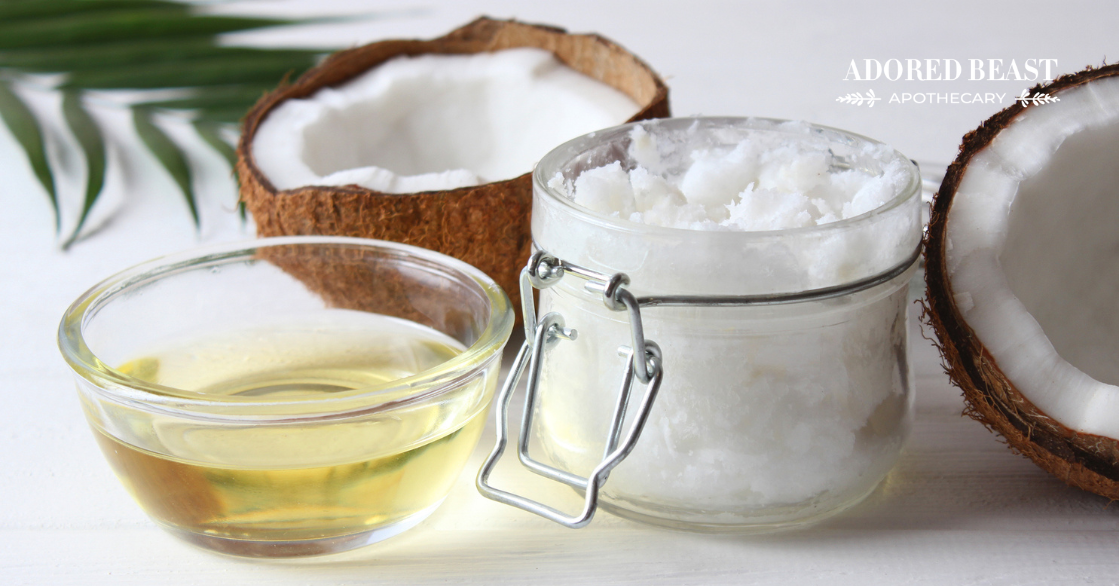Coconut oil is a popular supplement for humans, and it has made its way into the pet world as well. Known for its numerous health benefits, coconut oil for dogs can support your pet’s overall well-being both internally and externally. But there’s also another form of coconut-derived oil – MCT (medium-chain triglyceride) oil – that offers more targeted benefits.
In this blog, we’ll break down the differences between coconut oil and MCT oil, explain which one is better for your dog, explore their benefits, and provide guidance on how to use them safely.
Coconut Oil vs. MCT Oil: What’s the Difference?
Both coconut oil and MCT oil come from coconuts, but they’re not the same.
Coconut Oil
- Made from fresh or dried coconut meat.
- Contains a mix of fats, including:
- Medium-chain triglycerides (MCTs): About 60% of coconut oil consists of MCTs, which are metabolized quickly for energy.
- Long-chain triglycerides (LCTs): Slower to metabolize and stored more easily as fat.
- Contains lauric acid, which has antibacterial, antifungal, and antiviral properties.
MCT Oil
- A refined version of coconut oil that contains only MCTs (medium-chain triglycerides).
- Does not contain lauric acid, but focuses on faster-digesting fats like caprylic and capric acids.
- More easily absorbed and utilized for energy compared to regular coconut oil.
Which Is Better for Dogs? While coconut oil has many benefits, MCT oil is generally more effective for boosting energy, supporting cognitive function, and improving digestion because it contains a higher concentration of MCTs. It’s what we reach for when we want to feed it. That said, coconut oil’s lauric acid makes it a better choice for topical applications.
Benefits of Coconut Oil (& MCT Oil) for Dogs
There are many reasons to consider adding coconut oil for dogs to the diet or applying it topically.
Internal Benefits
- Boosts Energy and Brain Health: MCTs in coconut oil are quickly converted into energy, making it ideal for active dogs or those with cognitive decline. When our girl Inuk started showing signs of dementia, we started giving her MCT oil every day.
- Supports Digestive Health: Helps soothe an irritated gut, improves nutrient absorption, and supports a healthy microbiome. It can also help slow the growth of yeast in the gut!
- Improves Skin and Coat: Feeding coconut oil can reduce dryness, itchiness, and promote a shiny coat. It can be helpful for allergies as well.
- Helpful for Seizures: Research shows that a diet with MCT oil can have positive effects on the reduction of seizure frequency. In one particular study, 71% of dogs showed a reduction in seizure frequency, 48% of dogs showed a 50% or greater reduction in seizure frequency and 14% of dogs achieved complete freedom from seizures.
- Aids in Weight Management: MCTs can help regulate metabolism and maintain a healthy weight when used in moderation.
External Benefits
- Soothes Skin Irritations: Apply coconut oil directly to dry, itchy, or inflamed areas to moisturize and reduce irritation.
- Treats Minor Wounds and Infections: Coconut oil’s antibacterial and antifungal properties make it useful for cuts, scrapes, or hotspots.
- Improves Paw Health: Use it to soften cracked paw pads or protect them from harsh weather.
How to Use Coconut Oil for Dogs
Feeding Guidelines
Here are a few tips if you’re new to coconut oil for dogs. In this case, we suggest MCT oil over coconut oil to get all the benefits and less saturated fat.
Firstly, start slow. As with any new supplement, begin with a small amount and gradually increase to the recommended amount. Moderation is key, as too much coconut or MCT oil can lead to diarrhea or weight gain. Monitor your dog for any signs of digestive upset, such as loose stools, and adjust the amount as needed. Although rare, some dogs may have an allergic reaction to coconut oil. Stop use if you notice redness, swelling, or itching.
- General Rule:
- Small dogs: 1/4 teaspoon per day
- Medium dogs: 1/2 teaspoon per day
- Large dogs: 1 teaspoon per day
- Giant breeds: 1.5 teaspoons per day
Topical Application
- For Dry Skin or Hotspots: Gently massage a small amount of coconut oil into the affected area. Allow it to absorb, and prevent your dog from licking it off too quickly.
- Paw Care: Rub coconut oil onto your dog’s paw pads to moisturize and protect them from cracking.
- Flea Prevention: Coconut oil can be used as a natural flea repellent. Apply a small amount to your dog’s coat before they go outside.
Coconut oil and MCT oil can both offer incredible benefits for your dog, from boosting brain health to improving their coat and skin. Whether you choose coconut oil for its lauric acid or MCT oil for its concentrated medium-chain fats, these natural supplements can support your dog’s overall health when used correctly.












